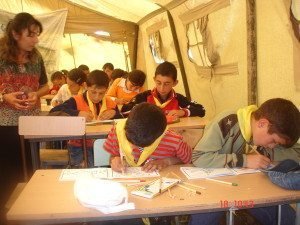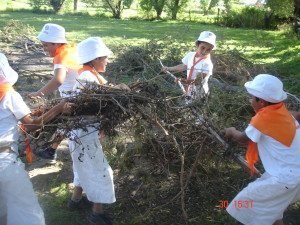
Snow has fallen. It is the last day of September, and Javakhk’s landscape is white again. In the village of Heshtia, Sisters Haguintha, Datevik, and Serpouhi smile at the beauty before them. They touch the shimmering, powdery softness and look around their convent grounds, surrounded with trees, and at the meandering, icy stream nearby which flows towards the river Kur. They remember the laughter and excitement of their 300 young charges, ages 6-14, and the tents pitched and filled with camaraderie, fun, and learning right here on these very same grounds. Sister Haguintha explains, “Just a few weeks earlier, the tents—our makeshift summer day camp called the Cardinal Aghajanyan Camp—were filled with children. For three months, June, July, and August, the days passed with such joy for them, for all of us. We had two sessions, one for the younger and one for the older children, and the hours were from 8am to 3 p.m. The children studied religion, Armenian language and grammar, computer, drawing, Georgian language, music, needlework, psychology, and sports. We went on hikes, played games, and took our meals together. On Aug. 30, the last day of camp, the campers, our volunteers (nine village schoolteachers and older teenagers), and we, the Sisters, played our final games. To celebrate the occasion, we dressed the children in matching tee shirts and hats with the name of our camp printed on them. That evening after mass, we had a bonfire and great merriment, thus ending this year’s camp season. On Sept. 2, we Sisters took 36 of our teenagers, who had helped us during the entire camp season, to Batum to enjoy five days at the Black Sea. The boys and girls had never seen the sea before. They had never even been outside of the village before, so you can imagine what an absolutely wonderful time they had!”

It is November now, and the Sisters have been busy with their duties of assisting the villagers in any way they can, as well as traveling back and forth to five schools in the area to teach religion. They regularly visit the sick and the elderly and spend time with the children. The youth choir they’ve established is growing. In a recent e-mail to me, Sister Haguintha wrote, “We Sisters have begun preparing for Dzmer Bab (Father Winter). Oh, how the children look forward to this special time of the year! For the seven villages in this vicinity, we are already preparing gifts for the children, some handmade, some shuga-bought. But the best gift of all that we can give them, and to everyone in Heshtia and the surrounding villages in Javakhk, is a medical clinic. We have no such facility in this area. So, we have been working very hard to make this—our Armenian peoples’ dream here—come true. Already, with the kindness and generosity of donors, brick by brick, the walls are forming. I hope and pray that one day their dream will come true.”
Photos courtesy of Sister Haguintha Mouradian


Be the first to comment